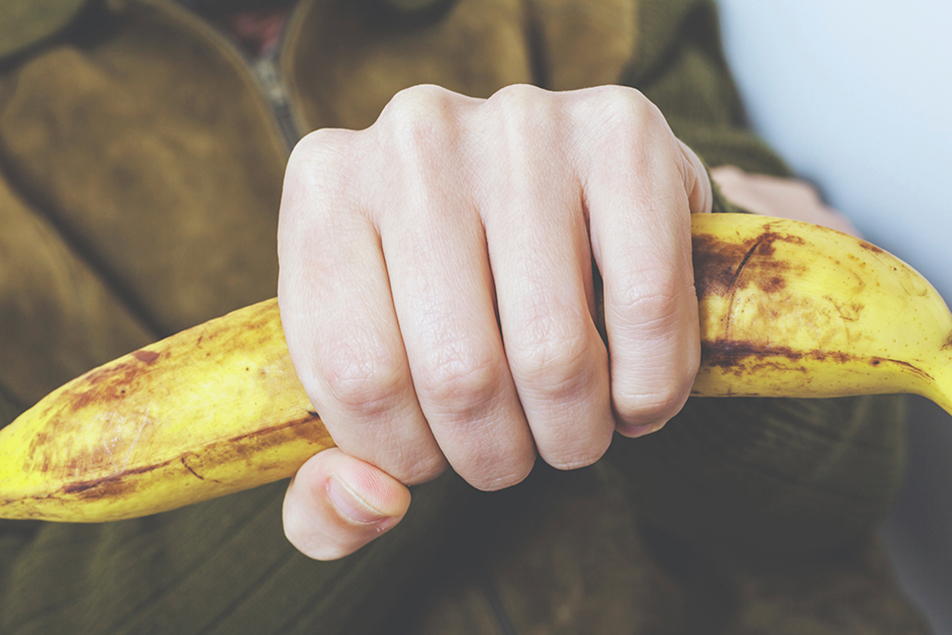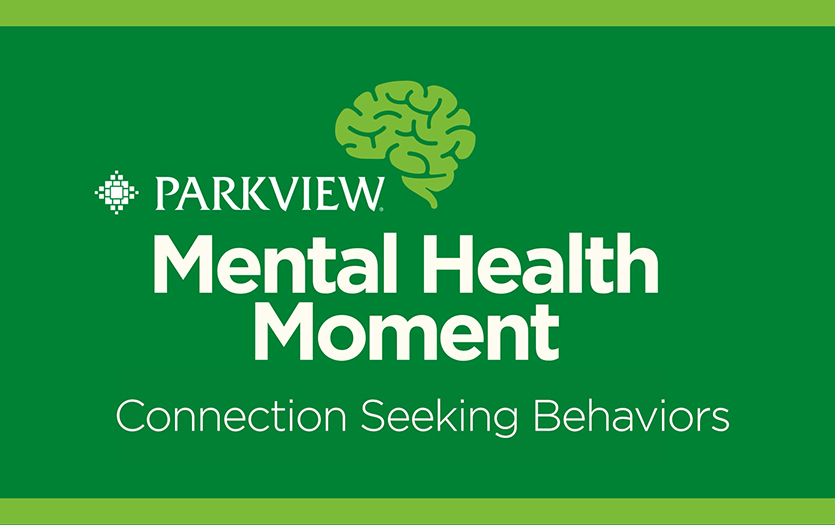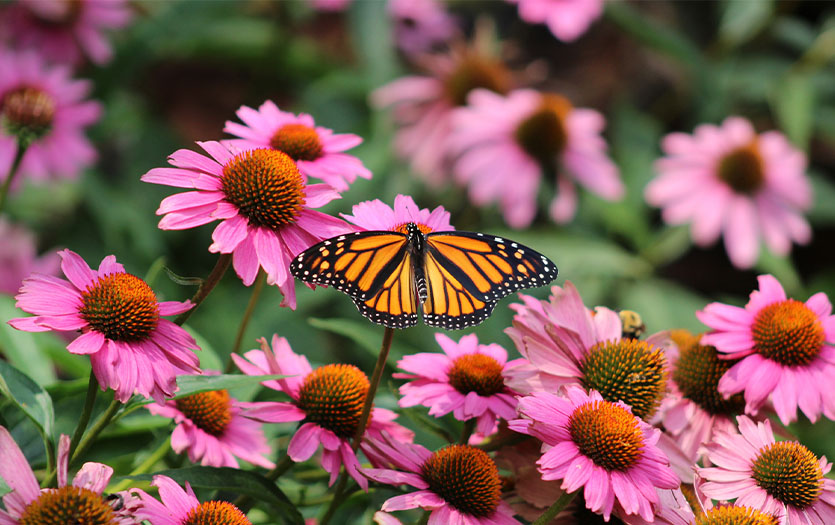
Enjoy this monthly mindfulness post from Dave Johnson, PhD, CNS, BC, LMFT, employee assistance specialist.
Several years back, I heard a story about how, in certain parts of India, there was an abundance of monkeys, similar to the geese problem in Fort Wayne. In order to corral the animals without harming them, they would put a bundle of bananas on the street inside a tightly woven bamboo box. The box was not exactly like a cage, the bars were closer together, but the monkeys could see and smell the fruit inside. Monkeys are curious by nature and so they would force their hands between the bars, which was a very tight squeeze, and grab a banana. When the monkey attempted to pull their closed hand back through the bar it would get stuck. The monkey would then scream and cry, always while still holding onto the banana. Of course they could go free, if only they would drop the fruit. But they wouldn’t. They would freeze and panic. The other monkeys, hearing the screaming, also grew curious and would reach for one of the other bananas under the bamboo basket. Soon, they’d have as many as ten monkeys with their arms stuck in the basket. I was told that the “monkey police” would then come and bag the poor animals and take them perhaps to a better place. Now, I’m uncertain where that place is, but I can only imagine.
More times than I can count, I’ve been guilty of holding onto “bananas” myself (I might also call these “patterns of stress reactivity”). I have noticed that sometimes my patients, colleagues, and friends are holding onto bananas, too. I learned many years ago from a workshop that I attended with the renowned scientist Dr. Hans Selye, that stress is a physical and mental reaction to any demand or change. It is an automatic response to fight, flee or freeze with anxiety, fear or panic. I know it’s important that I teach people the science and practice of mindfulness and stress relief through the Parkview Center for Healthy Living because changing our “reactivity” to stress can have a profound positive impact on our health.
I begin my classes by bringing awareness (mindfulness) to automatic, unthinking patterns and encouraging people to pause and bring more intention to their response to stress. It seems to me that there are an abundance of opportunities to practice this notion of letting go of bananas and observing, mindfully, which bananas are worth holding onto.
- What are your bananas? Who, what, where and when are your triggers tripped and you flood with emotion, stress, fear or anxiety? Are there times, places or people that should be avoided? Of course it’s not always possible to reroute your drive when you’re in heavy traffic, but noticing that you are reacting to certain situations and people might cause you to re-think your route or with whom you are traveling.
- Does the banana smell rotten? Practice noticing what is spoiled in your environment and therefore shouldn’t be eaten. This is a metaphor for identifying toxins in our everyday lives. Not all toxins can be avoided (sometimes our co-workers, bosses and customers that we service come with the job) but we can choose to notice and have awareness of their negativity and not tag along emotionally. Building awareness of what is healthy, good and sparks joy is a healthier response.
- What does the stress reaction feel like? Sometimes I notice my chest gets tight or I clench my jaw. Bringing awareness to the sensation and taking a slow deep breath, or even touching, patting or massaging my tightness, helps soothe and reduce the muscles that are reacting automatically. If I’m not in immediate danger – which I rarely am – then this primitive response is a bit over-exaggerated. Noticing my bodily cues helps me connect the dots of my reactivity and begin to let go of at least the musculoskeletal response part of the reaction.
- Are there bananas that I can/could/should let go of? Are you holding onto long term or old anger, hurt, resentment, loss or perfectionism? What if you could just drop it? Would you feel a bit less stressed? Sometimes I notice that a chat, cry or regurgitation of my flooding emotions with God, a good friend, pastor, counselor or family member helps me name and sort through where the flood of emotion is coming from. Once I can sort through it, I can move on.
- How can writing it out help me to drop the banana? Revisit this post on journaling and consider utilizing this process to let go of bananas.
- What are my patterns of reactivity? Try to take notice of whether a person or situation sparks fear, anxiety, anger, resentment, or the fight, flee or freeze response. Is your response healthy or do you need a different approach? (Yes, it’s OK to run from the bear in the woods.) Sometimes getting stuck in the reactivity of what you did, didn’t do, could have done, should have done, etc. causes you to repeat the stress reactivity over and over again in your mind. Giving yourself permission to come back to the now is why practicing mindfulness meditation is so important. Practice it formally and informally so when you need it, it is in your tool kit of responses.
- How can I cultivate curiosity versus becoming immobilized by anger or fear? I often say, “Isn’t that interesting” in my head when I notice I am reacting internally to a stressful situation. It has a calming effect on the nervous system and helps me to not say or do something I might later regret. Pairing curiosity with moments that spark excitement not only helps to build our awareness of the internal mechanisms, but also helps us view others from a calmer place.
- What other metaphors capture the essence of our desire to let go of stress? The tsunamis of life are real. Attaching images of clouds, waves and storms help us visualize the passing of stress and bringing hope to a brighter tomorrow.
Taking time for practice!
Practice can be very practical and informal, such as pausing in the four examples above or formal as in a mindfulness based stress reduction (MBSR) sitting meditation.
Try a guided meditation with Dr. Johnson.
Find a relaxing space and follow along as he leads you through a brief mindfulness practice*.
Mindfulness-based stress reduction practice has been extensively researched and proven helpful for coping with changes, grief, healthy eating patterns, pain, anxiety, depression and many other chronic disease and autoimmune disorders. For more on stress management programs and techniques, contact the Parkview Center for Healthy Living at (260) 672-6500. Dr. Johnson also provides on-site guidance for teambuilding and transformational leadership, among other topics. To learn more about Employees Assistance Programs for your company, call Business Development at (260) 373-9013.
*Dr. Johnson cautions anyone practicing this meditation to avoid doing so while driving or doing any other activity that requires your absolute concentration.
Other resources:
- Free 1:1 Stress and Mindfulness consultations (telephonic or in person) or Free Stress Relief Mindful Meditation Practice sessions With Dr. Dave Johnson: Call the Parkview Center for Healthy Living (260) 672-6500.
- Dr. Dave’s TedxFortWayne talk on Integrate Mindfulness
- Kabat-Zinn, J. (1990) Full Catastrophe Living. Delta Trade Paperbacks.
- Follow Integrate Mindfulness on Facebook
- More resources



